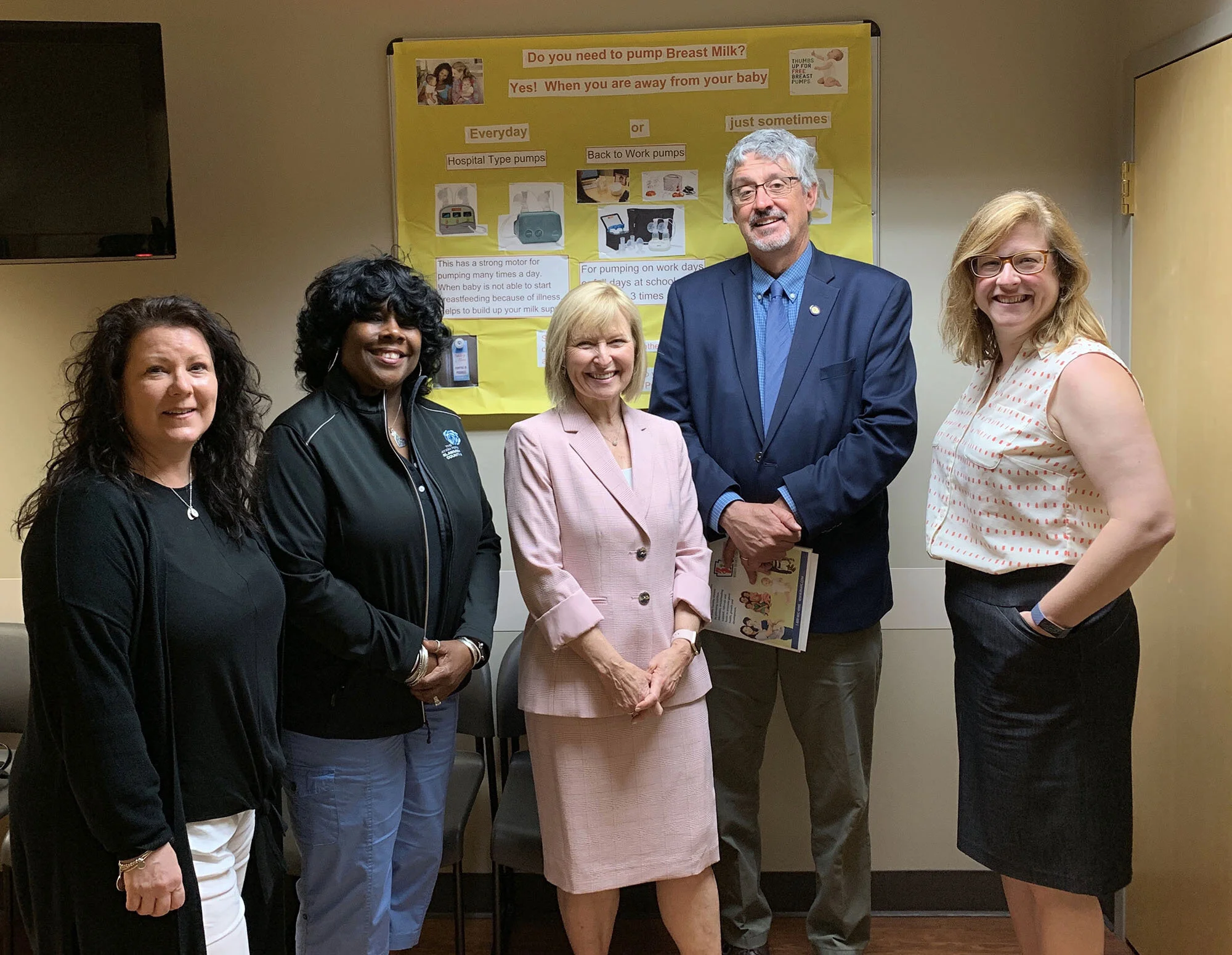Incoming Delco Council Engages Community as Resource
Frances Sheehan, director of the Foundation for Delaware County, (center) with (l to r) the foundation’s WIC director Filomena Ahlefeld, Vice President for Programs Joanne Craig, State Senator Tim Kearney, and State Representative Leanne Krueger at the Springfield WIC Center.
When Ben TerMaat was getting ready to read applications for the Delaware County Transition working groups, he thought there might be a couple hundred to sort through. Instead, he found himself up to his ears in emails: Close to 900 people had thrown their hats into the ring.
Delaware County Transition is a recently constituted not-for-profit aiming to help the newly elected Delaware County Council set priorities for the upcoming term and recommend approaches to making change. The council, which will be installed on January 6, is the first ever to include a majority of Democrats.
Three days after the application deadline, TerMaat and his team of volunteers had chosen approximately 200 people for 12 groups. “I pulled a couple of all-nighters,” he says. “I got to re-live being in college.”
For TerMaat, who also works as Congresswoman Mary Gay Scanlon (D-5)’s political director, college is not exactly the distant past. A native Nebraskan, he entered Swarthmore College in 2014 and dove into politics. “I quit playing tennis, I quit doing pottery, and I started volunteering on campaigns.” First, he volunteered on Leanne Krueger’s longshot bid for the state representative of PA-161, and later he worked with Scanlon. This fall, after Democrats won three seats — and a majority — on the county council, TerMaat found himself shepherding the effort to invite community involvement during the transition.
“We saw the transition as an opportunity,” he says. “The Democrats ran on a message of really changing things...and we knew if we actually wanted things to be different, it would take some active effort. And that people were watching.” Asking the public to participate was part of that change.
An Inclusive Process
The process for inviting in the public was designed to be as inclusive as possible. Applicants were merely asked to send a short statement explaining their interest. Resumes were not requested, because the organizers didn’t want to create unnecessary obstacles to participation. Party affiliation was not a part of the applications either.
The resulting working groups are intentionally diverse. They include Harvard Ph.D.’s and home health workers, Democrats and Republicans, people who currently work in county government and complete outsiders. Approximately 20 of the members live in Swarthmore, as does TerMaat. There are 12 working groups in areas such as criminal justice, economic and workforce development, natural resources, and finance. Each group includes current and/or incoming council members. Each is responsible for developing its own process and breaking into whatever subcommittees it deems useful.
Some of the groups will likely disband when the new council is sworn in. Others, like Ethics and Transparency, will continue to meet in some capacity. “You can’t talk about ethics and transparency for two months and then stop,” TerMaat says. “It’s going to take years to change a lot of these things.” He points to the county’s hiring practices. “They don’t advertise jobs. Job openings just get filled and no one even knows that they’re open.”
TerMaat believes that including the community in the transition process will have a ripple effect, creating a more engaged populace. “You quit being engaged when you feel like your participation doesn’t matter.”
Toward a Public Health Department
The group focusing on public health is also likely to continue. Frances Sheehan, also of Swarthmore, serves on this committee. President of the Foundation for Delaware County, Sheehan has a long history working in public health. She served as President and CEO of the Brandywine Health Foundation in Chester County for nearly 15 years, and before that she ran Planned Parenthood of Chester County.
With over half a million residents, Delaware County is one of the few counties of its size in the country to lack a department of health. This means that state and federal grants to address public health issues are largely not available here. Sheehan is part of a transition subcommittee exploring funding to study the feasibility of establishing a county health department.
Like TerMaat, Sheehan notes the cooperation of Democrats and Republicans, and of newcomers and county employees, in the working groups. “The woman who runs the current interagency health council [Delaware County Intercommunity Health Coordination], Lori Devlin, is on the committee. What we’re really looking at is how we can build on the work that Lori and her team have been doing all these years.”
Without a formal department of health, public health efforts in Delaware County have been severely limited. Health data is not collected in a coordinated fashion, which means that outbreaks of disease can easily go unnoticed. This happened with syphilis a couple of decades back, according to Sheehan. “By the time they recognized it, public health nurses from all over the state had to come into Delaware County to help.”
County health departments also work on water quality, restaurant and food safety, nurse-family partnerships, and disaster preparedness.
Eagerness for Change
Incoming county council members Christine Reuther and Monica Taylor are part of the public health working group, and Sheehan says they are eager to make changes. “I did not anticipate how action-oriented the new council members were going to be.” She adds: “We’re lucky to have such public servants, because they also have full-time jobs.”
The community energy of the working groups is part of a larger trend Sheehan has seen over the last few years, as Delaware County residents increasingly turn their attention toward the diverse, vibrant, complicated county in which they live. “Suddenly people want to get active, they want to get involved,” she says. “There’s so much we can do by reaching across boundaries to work together.”




